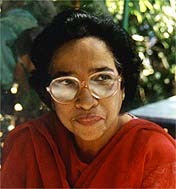 Chausseestrasse 125 in Berlin Mitte was the home of
Helene Weigel, actress and Art Director of Berliner Ensemble, where she lived
with her famous writer husband Bertold Brecht, from 1953 until her death in
1971. Her life is a fascinating story of courage, talent and determination. The
guide who led us through this Memorial was so enthused with the lives of these
two people that it left us hankering for more information.
Chausseestrasse 125 in Berlin Mitte was the home of
Helene Weigel, actress and Art Director of Berliner Ensemble, where she lived
with her famous writer husband Bertold Brecht, from 1953 until her death in
1971. Her life is a fascinating story of courage, talent and determination. The
guide who led us through this Memorial was so enthused with the lives of these
two people that it left us hankering for more information.
Helen Weigel was born in Vienna to Jewish parents. Her
father Siegfried Weigel was the Accountant General of a textile factory and her
mother Leopoldine Pollack, was the proprietor of a toy shop. Even at an early
age, she showed her determination of becoming an actress. Much against her
parents’ wishes, she started taking lessons in acting in 1917, and moved to
Frankfurt. Helene was helped by Danish author Karin Michaelis to go on stage at
17. She acted for several years at the Frankfurt Theatre and Playhouse. She
moved to Berlin in 1922, where she trained under Max Reinhardt, and worked at
the Berlin State Theatre under the direction of Leopold Jessner.
Helen was of short stature and her photographs show her
as not so beautiful. But she had a deep and forceful voice that held her
audience captive. She chose maternal roles like Mother, Mother Courage, Theresa
Carair in Senora Carair’s Rifles and many others. These roles brought her fame
as an actress.
In 1928, she officially resigned from the Jewish
community. She married the famous poet and playwright Bertold Brecht on April
10th, 1929, and performed in many of his plays.
She became a member of
the communist party in 1930. Though Brecht was a believer in Marxism, he never
really became a member. They were both opposed to Hitler and Nazism, and after
the burning of the Reichstag in 1933, had to flee Germany. They were forced to
spend fifteen years in exile in countries like Denmark, Sweden, Finland and
finally in USA where they stayed for six years from 1941 to 1947. Helene
couldn’t act during her years in exile but she continued with her voice and
body exercises. Her German citizenship was cancelled in 1937, and Brecht’s in
1935.
After the end of the war, Helene and Brecht returned to
Berlin in 1949, via Zurich. Though Helene had reservations about East German
totalitarianism, she was careful not to antagonize the party. So she was able
to retain her position of Administrator and Director of the Berliner Ensemble
till her death. Now Brecht was able to bring out his plays written in exile and
have them played out on stage. The couple became prominent in German Theatre
circles. Helene was able to produce and publish Brecht’s complete works as
Director. She also acted in some of his famous plays.
Though professionally they were a team, Helene had many
challenges to battle. Brecht was a womanizer and his dalliance with various
women brought about alienation in their marital relationship. While he stayed
on the first floor of the house on Chausseestrasse, she moved to the second
floor. They had a common kitchen on the ground floor. Brecht’s apartment has
been retained as it used to be in his life time, with an assortment of tables,
chairs and faded sofa sets, his typewriter, his writing implements and books.
His bedroom and bed on which he breathed his last are also preserved. He died
of a heart attack brought on by a viral infection in 1953. Helene continued to
live in the same building till her death. She moved into a modest ground floor
apartment overlooking a small garden. Her 2nd floor apartment was
converted into the Bertold Brecht Archive which houses all her husband’s work.
It was a labour of love. She was the executor of his estate.
Helene was a philanthropist. She gave generously to
orphanages and charities. She was known for her strength, energy, diplomacy and
humour. She held open house for actors and friends and was an excellent cook.
While in USA, she sent food packages to starving artists. Bertold Brecht
commented on her modesty as an actress. “Never did she set out to show her own
greatness but always the greatness of those she portrayed.”
During her years in exile she was under surveillance of
the FBI. She never lost her sense of humour and invited the FBI agent to come
indoors from the cold so that he could observe her closely. She was also spied
upon by the East German police.
In 1950, she became the founding member of the German
Academy of Arts. In 1954, she stood as a candidate for the SED party in
parliamentary elections. Helene was awarded the National Prize of GDR in 1949,
1958 and 1960. She was bestowed the Patriotic Order of Merit in Silver, and
also the Clara Zetkin medal.
Helene was a chain smoker and suffered from lung cancer. In
her last year of life she gave up smoking. But she died of multiple fractures sustained
after acting for the last time in Paris. She died on May 6th, 1971, fifteen
years after her husband’s death. Their house was open to the public in 1978. One
is only permitted a guided tour to the first and ground floors.
The couple is buried side by side in the neighboring Dorotheen
Stadischer Friedhof, with simple rock headstones on which their names are engraved.







